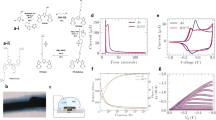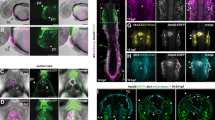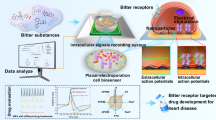Abstract
A PAPER now in the press1 shows that the heart accelerating factor from the corpus cardiacum of the cockroach Periplaneta americana described by Cameron2,3 acts by stimulating the pericardial cells to produce a second substance. It is this pericardial cell factor which is responsible for the direct stimulation of the heart. This communication describes the properties of the two substances.
This is a preview of subscription content, access via your institution
Access options
Subscribe to this journal
Receive 51 print issues and online access
$199.00 per year
only $3.90 per issue
Buy this article
- Purchase on SpringerLink
- Instant access to full article PDF
Prices may be subject to local taxes which are calculated during checkout
Similar content being viewed by others
References
Davey, K. G., Gen. Comp. Endocrinol. (in the press).
Cameron, M. L., Dissertation, Cambridge (1953).
Cameron, M. L., Nature, 172, 349 (1953).
Davey, K. G., Canad. J. Zool., 38, 717 (1960).
Weissbach, H. H., Waalkes, T. P., and Udenfriend, S., J. Biol. Chem., 230, 865 (1958).
Jepson, J. B., and Stevens, B. J., Nature, 172, 772 (1953).
Davey, K. G., Canad. J. Zool., 38, 39 (1960).
Author information
Authors and Affiliations
Rights and permissions
About this article
Cite this article
DAVEY, K. Substances controlling the Rate of Beating of the Heart of Periplaneta. Nature 192, 284 (1961). https://doi.org/10.1038/192284a0
Issue date:
DOI: https://doi.org/10.1038/192284a0
This article is cited by
-
Ultrastructure et physiologie des organes �pipharyngiens et hypopharyngiens (chimior�cepteurs cibariaux) de Blabera craniifer Burm (Insecte, Dictyopt�re)
Zeitschrift f�r Vergleichende Physiologie (1971)
-
Neurosecretion
Zeitschrift f�r Zellforschung und Mikroskopische Anatomie (1969)
-
Neurosecretion. XIII. The ultrastructure of the corpus cardiacum of the insect Leucophaea maderae
Zeitschrift f�r Zellforschung und Mikroskopische Anatomie (1963)



